Chrono Cross faces a difficult hurdle – following up a game with a reputation like Chrono Trigger. Whatever your preference, it’s not controversial to say that Chrono Trigger had and has an enormous following. And it’s not controversial to say that some of Chrono Cross’ most polarizing elements are born out of this association. But is this entirely fair?

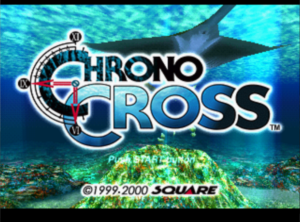
My feelings about Chrono Cross are a little tricky to articulate. There are many things I like about it, some elements that take away from that. This is a game that I initially didn’t care for twenty years ago, really liked ten years ago, and have found my opinion is still evolving today.
Gameplay
My real issue with Chrono Cross when I first got to try it so many years ago was the gameplay and combat. Admittedly, at the time this was largely because I was such a fan of Chrono Trigger’s take on the Active Time Battle, battles happening on the maps you were exploring instead of transitioning to a dedicated screen, positional consideration when using tech or avoiding enemy special attacks. Call it petulance or simple disinterest, but it just didn’t grab me.
Had I had the opportunity to play for a few hours more, I probably would have warmed up to it. Chrono Cross plays on a stamina system. Spend stamina on various level of attacks to build up your element level, recharge your stamina as other characters take actions or you defend. Every character has a grid template that allows them to stack multiple elements of various levels, many of them defining their potency based on where they have been positioned. There are six elemental colours, three sets of counters. Red and Blue, Yellow and Green, Black and White.
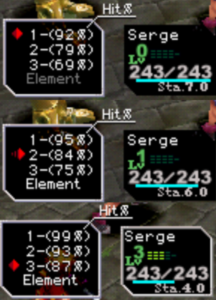
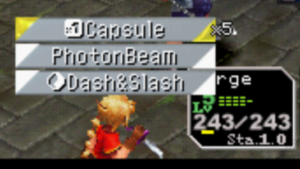
Every character also has an innate colour, which also determines the alignment of your regular attacks, your vulnerabilities, and grants you access to elements exclusive to your intrinsic colour. Strategy starts to open up more and more as you gain elements that are more than pure damage. Either through secondary effects, like Ice Blast’s ability to freeze. Buffs and Debuffs, the ability to change or seal colours, effects like Diminish or Magnify which amplify or suppress elemental damage for everyone in the battle. As you cast elements of certain colours the field effect in the upper right corner will shift. This increases the potency of future casts of that element, and reduces the potency of its counter. In the event you fill all three slots you gain the ability to cast the powerful summon elements you’ll find throughout the game.
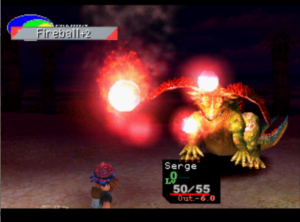
So in that regard as systems open up and strategy becomes available – this system improves dramatically. I think it’s fun when it get off the ground, but I feel there are only a few encounters I really had to plan around. Chrono Cross doesn’t do experience points in the usual way, it uses a milestone system for level ups with required bosses generally being the milestones. There’s a chance to gain some stats in battles following a boss encounter, but bosses are the guarantee. This is a system geared to prevent the party from overlevelling – and it also keeps the large roster of characters up to par offscreen. This means that grinding is greatly reduced, mostly for drops, and that you are usually required to tackle encounters when the developers intended them to be taken on. Chrono Cross is generally a pretty easy game, but it has a couple of standout fights in a first playthrough that can take you by surprise.
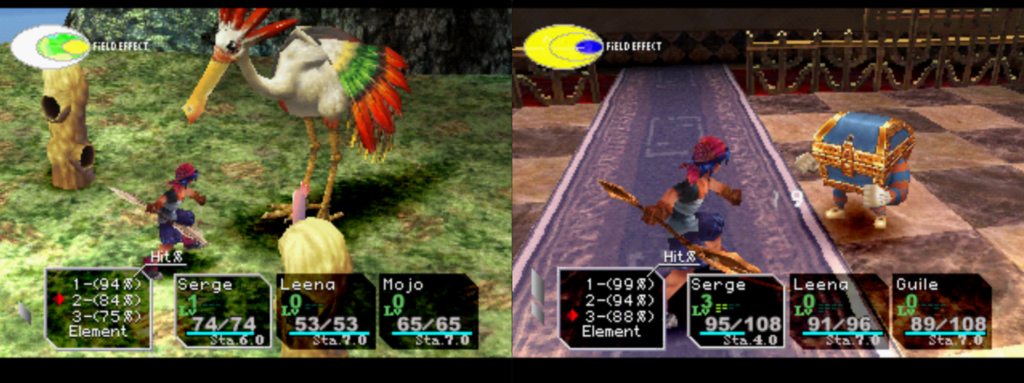
It streamlines things in a game with over forty characters and prevents powerleveling. I’m glad that characters outside of your active party maintain some kind of pace with your active characters because it would take away from the natural momentum of the game to stop and micromanage them every star level. That could be the most efficient way to play, I’m not sure if only your active members get the mini level ups, but I don’t think that’s largely needed with an understanding of elements and mechanics.
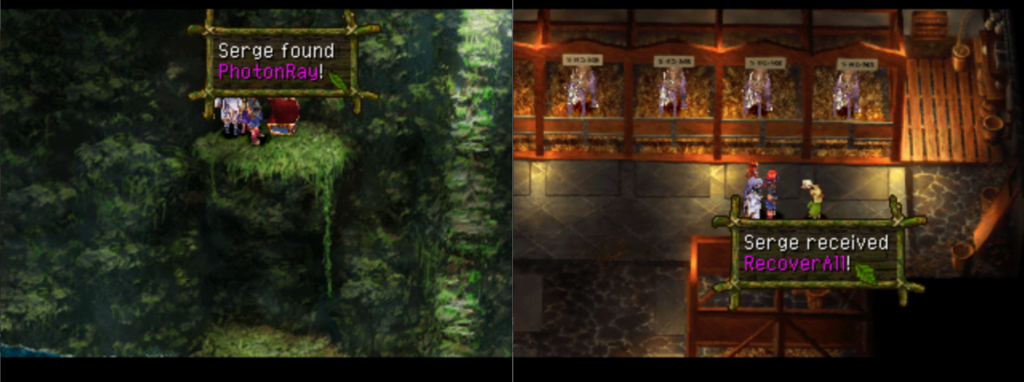
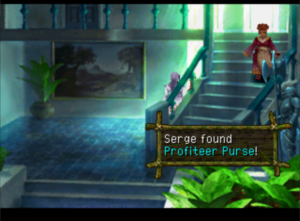
Narrative
This is where there might be mild or contextual spoilers.
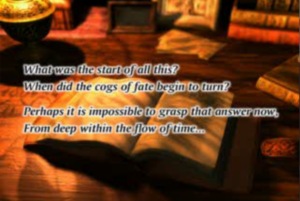
Chrono Cross’ narrative is a very personal story close to Serge and the El Nido archipelago for most of the playthrough. So while it opens up more and more as the game progresses, the real beats often stay close to Serge and a few others you could consider main characters. Early in the game Serge finds himself in a world where he doesn’t belong anymore. He’s a free radical. His entire existence is a contradiction that drives the plot forward.
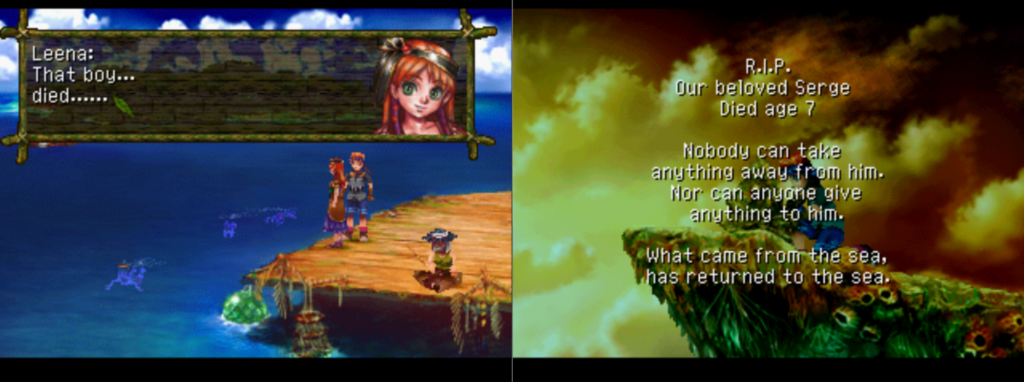
I think the very melancholic atmosphere of Chrono Cross can get to some players, but the atmosphere is important to the storytelling. There’s a sense of nostalgia for somewhere you’ve never been, the music especially drawing the player in. And this can result in some brilliant emotional framing. Chrono Cross has an incredible score, and it helps with context.
Chrono Cross is a story about identity, destiny, dogma, and autonomy. I think it does super well in the first two thirds of the game. There’s allegory and mystery and it works well, but towards the final third it edges into more and more exposition dumps. The game often berates or accuses the party and proselytizes towards them, but this much is by design. When you’re being fed rhetoric you shouldn’t just take it as fact, you should be asking questions about everything you’re being told. I think that’s a natural response to some of these arcs.
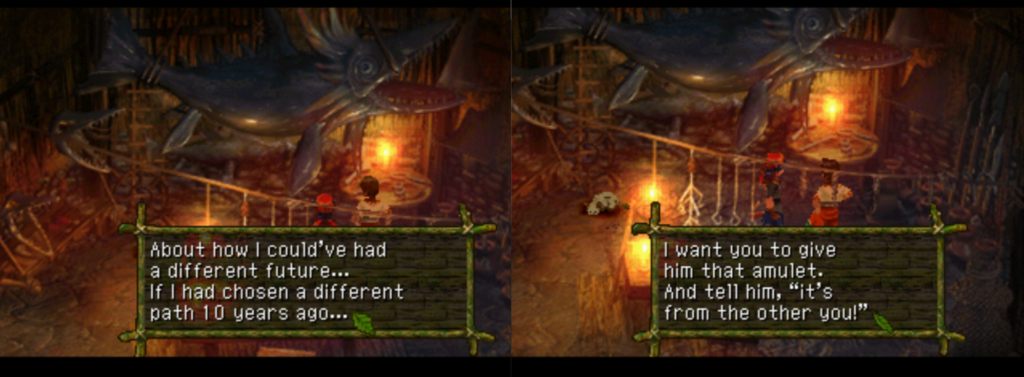
The Sea of El Nido is a place steeped in mystery and to get the most out of its lore and characters it pays to explore. Not everyone gets the same treatment, but the moments around certain groups – like those who knew the missing hero Dario – are particularly effective. Although Chrono Cross can’t hope to flesh out everyone to the same degree, it still has a lot to offer to those closer to some of the main beats throughout the story.
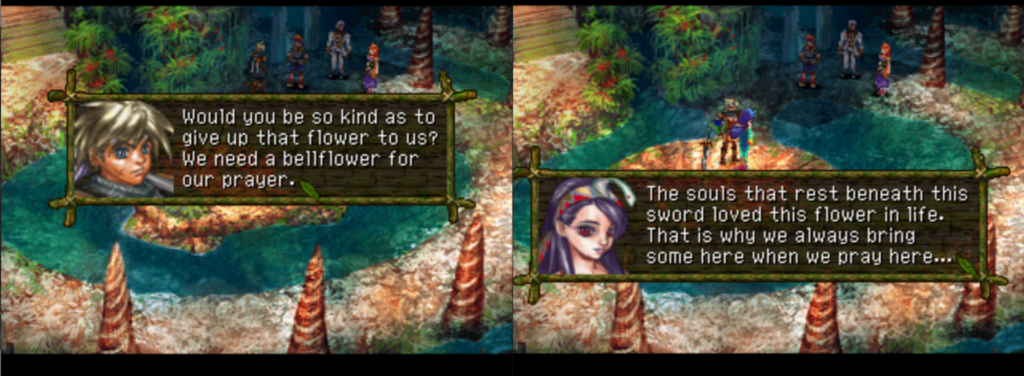
Chrono Cross gets convoluted at points. Not no much in being ‘confusing’ since much of it is explained ingame. It’s more in a Machiavellian sense once you start to see how the gears started turning. It’s eclectic, but then again a lot of PlayStation era RPGs were just that.
One of the core criticisms of Chrono Cross’ story is the fate of some of Chrono Trigger’s characters. Taking place in 1020 AD, Porre has become a military power and has sacked the Kingdom of Guardia. Many characters are unaccounted for. Cross takes place in a grouping of islands not on Chrono Trigger’s map so their fate on the Zenan mainland is largely offscreen. It also casts the canon ending of CT in a much more somber light. Some of the presumed fates of these characters can sour player opinion before they even play the game.
A common opinion is that Chrono Cross would have been much better without the connection to Trigger. As the game exists now, they are inextricably linked. Cross references eras and characters and events from Trigger, and Chrono Trigger is the reason Chrono Cross could even happen. The game often explains these events but sometimes it will name drop characters and if I didn’t already have experience with them from Chrono Trigger then their relevance to Chrono Cross’ plot wouldn’t have any impact for me. So much of the framing of Chrono Cross is reliant on Chrono Trigger then they would have had to change or add a considerable amount of things. Maybe that would still work, but I feel having played these events rather than having read about them has more of an effect – for better or worse.
Chrono Cross isn’t a direct sequel to Chrono Trigger, but it’s a consequential sequel. For all the best intentions messing around in the timeline will have a cascade effect and something is going to give. I don’t expect people to like what happened, but it makes sense that it did.
So the thematic beats of Chrono Cross are generally quite interesting and the world is steeped in mystery. But I think the script has been diluted in place to accommodate the sheer glut of characters available. When every character needs to have a generic response to an ongoing scenario in their own dialect or accent then fewer characters can have real story relevance.
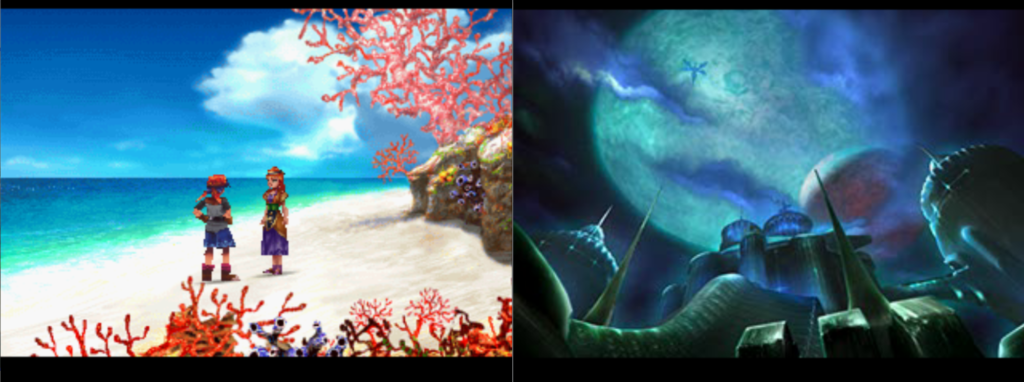
Character
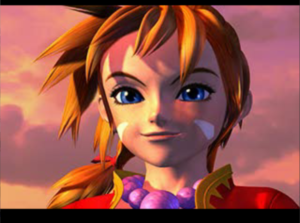
Chrono Cross has 45 playable characters over the course of the game and when you have that many characters vying for time in a story that is usually pretty personal you’re going to lose some relevance over the course of the game.
Dipping back into narrative, I said I believe the volume of characters possibly diluted the script for Cross. I think with a much tighter cast, everyone could have real investment in the plot and have meaningful character moments in big scenes. Some characters do get special lines, if you had the foresight to bring them with you. Other characters simply walk into the scene alongside your party of three to give their input. I would have rather had more detailed conversations than expositional monologues.
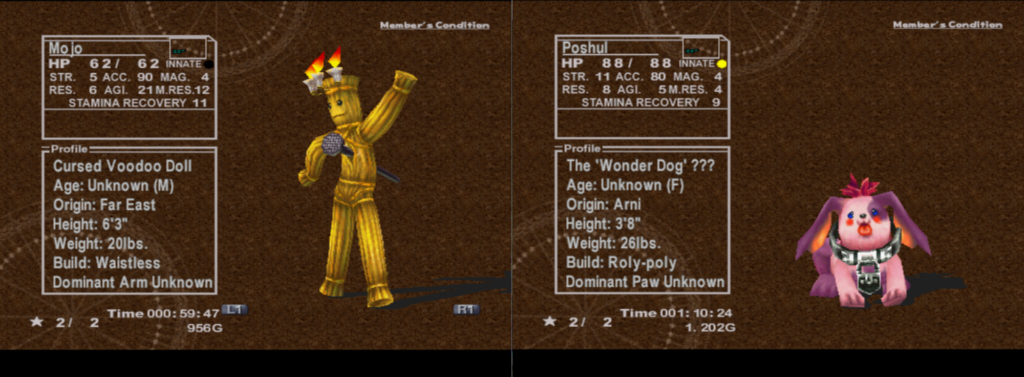
The funny thing is, I actually warmed up to the roster much more this playthrough than when I last played it ten years ago. When I had my proper run through the entire game I chose characters that had definite plot relevancy. Main characters or near enough to them. I wanted to maximize the plot I was getting and I actually really liked the characters I chose. It worked out. But this time, I tried most new characters I recruited and began to like some of them or see some of the more unique qualities of others. And I actually had a lot of fun trying to see who I liked the best.
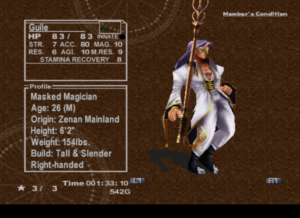
If Chrono Cross ever gets remade I don’t think you could cut down on the amount of characters. I’m sure there’s a lot of people out there who have a favourite character you wouldn’t expect. With the sheer variety on display it’s plain to see. The other reason is simply character availability. There are times in the game where the circumstances dictate you can’t use all of your recruits. The game makes you explore other characters as options become unavailable. For that reason you can’t really cut down the pool.
Availability also plays into your choices through the story. You can reject many of these characters, or choose not to ever engage with them. You can choose to reject one of the most plot relevant characters in the game and you have to do this to gain access to a fan favourite character with a lot of personal story of their own. It’s not a decision that a lot of first time players would think to make, it seems callous (though realistic) for the protagonist to make these decisions. But Chrono Cross is a story with themes of autonomy and for the game to allow you deny such an important character stands out.
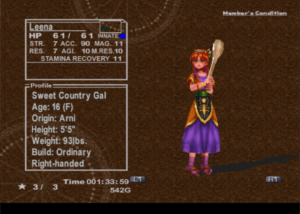
Serge stands out because he doesn’t belong, and the more time he spends where he doesn’t belong the less he’s going to belong where he came from. Perhaps his presence is such a disruptive force that strong willed adepts are naturally drawn to break away from routine – he’s almost like a virus in that respect. Or perhaps the question is, “why shouldn’t more characters want to take an active role in the welfare of their home?” After all, a story about Serge steadily expands to a much wider scope. Although I believe some of these characters were solid as NPCs and could have supported the main characters actively in that capacity. I can’t knock the ambition.
Concluding
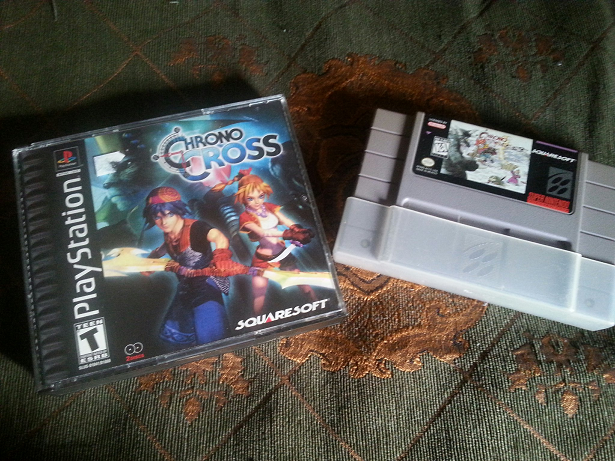
Chrono Cross is subject to hyperbole. It’s different from Chrono Trigger, its narrative deviating from even Radical Dreamers. This difference and the way that Chrono Trigger’s canon was changed with its follow-ups and rereleases on PlayStation and Nintendo DS becomes a predominant factor in Cross discussion. And I understand. Chrono Trigger is an important game to many of us. It’s a game I played with my older brother and a game – one of the last big JRPGs from before he went to University. It’s a game I played from start to finish more than any other JRPG I can think of on multiple platforms. Many of us have an emotional resonance with this game, and it’s natural to care about its trajectory beyond the endings.
But Chrono Cross doesn’t ruin Chrono Trigger. Every moment that captured you in Chrono Trigger is just as valid as it was then. And I commiserate with the events and implications between Trigger and Cross, I’m not generally pleased with the outcome. But Chrono Cross isn’t an erasure of Chrono Trigger, it’s a look at the consequences of time travel and the resilience of a threat beyond comprehension. And beyond that it’s an exploration of themes of will and fate, and personal discovery. It has a lot to offer of its own.
Trying to actualize my thoughts about Chrono Cross have been more difficult than many other titles I’ve looked at on this site. It has all of the trappings of a game I want to say is incredible but I still have some hang-ups with it. I still think the gameplay lacks a bit of nuance, I still think the volume of characters dilutes the script, and I still think the dissemination of story could be tightened up a little. But there are so many elements that grab me, that the result is a net positive.
The fact of the matter is that I liked Chrono Cross more now than when I last played it. And when I last played it, I liked it much more than when I first played it. I think that when I next play through, I’ll likely enjoy it even more. I allowed myself to get engrossed in the people of El Nido, I allowed myself to let myself be guided by the emotional framing of its important scenes. And I found that some of the issues I had were lessened.
Although this game will not escape comparison to Chrono Trigger, I would encourage you to try to play Chrono Cross in a vacuum should you ever decide to play it. Consider it as an entity of its own constituents, try to regard it on its own merits and shortcomings. There’s enough worldbuilding and execution here that it deserves that much.
Chrono Cross is ambitious and unafraid to take different turns from the games that preceded it. I don’t think that’s a negative trait inherently. That’s not to say you should make yourself play the game if you feel strongly about it. But if you have the opportunity to play it then try to take the game for its own qualities and judge the execution of that ambition.
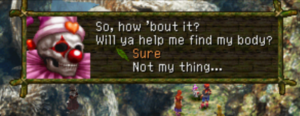
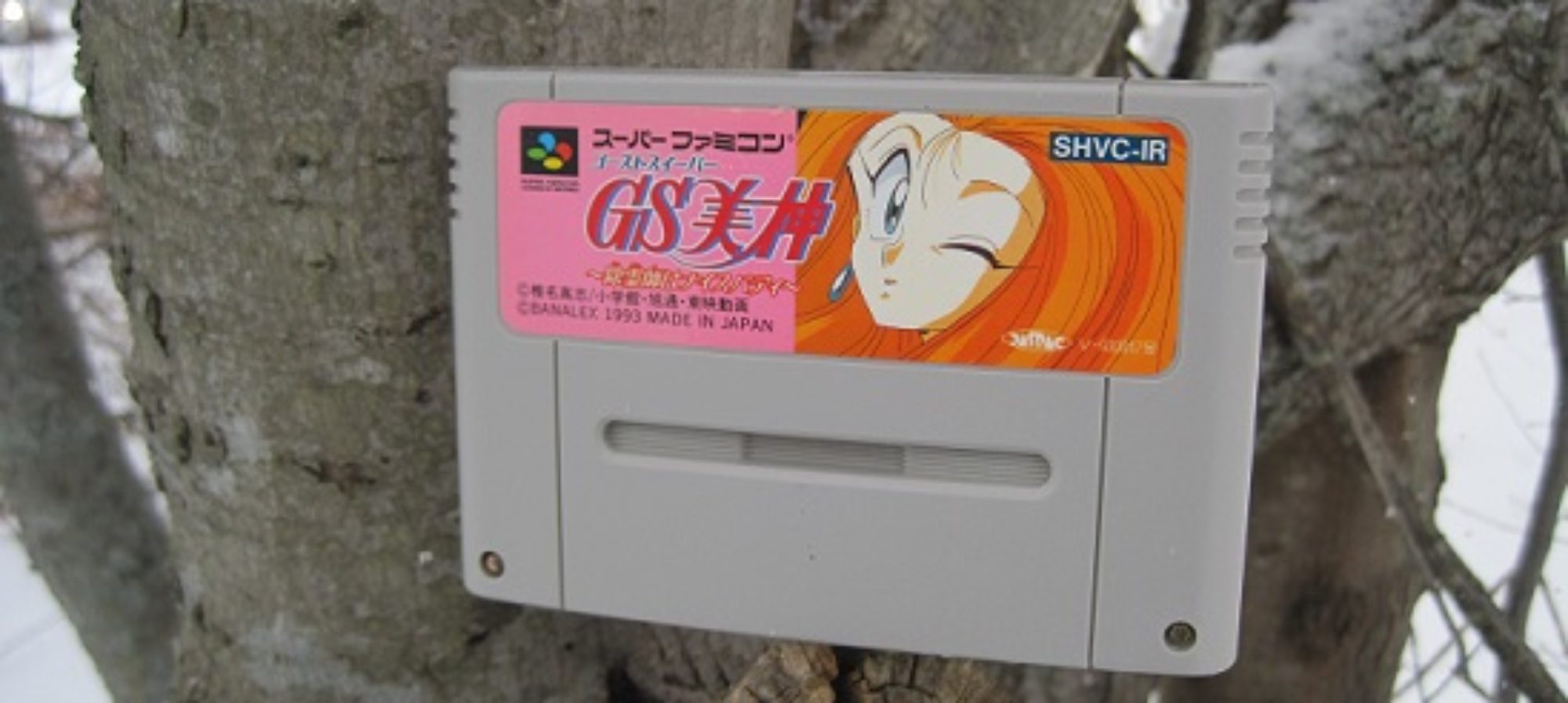
Chrono Cross is certainly very different from Trigger, which is going to naturally cause an extent of aversion for some. I prefer Trigger, but Cross is still an enjoyable game for me.
CC has a great music. Even its detractors would surely admit that. It really elevates the game to a level it wouldn’t be at otherwise with a weak score. I would say it’s the de facto best of the game.
The environments do match the score really well to give the game a great atmosphere, which helps boost the enjoyability of the game immensely. Something I hate about the majority of modern games is how lacking both are now.
It’s been a long time since I played but I have good memories of it my first time going through it.
It’s too bad it was the last Chrono game… thanks FFXI?
Was Chrono Break cut because of FFXI then? That would fit the timeframe. It’s been so long since that game got canned that I wonder if it’s even possible to introduce a new entry now. Would Square Enix consider it financially viable? Shakier prospects have been backed however. If rumours of Cross remaster are true there could be hope yet in generating new interest, not to mention the draconic handling of fan projects.
It helped, at least. Once they moved on, it was done.
“However, the game would ultimately go unproduced, with many members of the internal development team either moving on to Final Fantasy XI or leaving the company in favor of freelance work.”
Let’s see a remake of either, or both. 😉
Unfortunate.
A lot of the reception for these games is in a retrospective conscience. I suppose you’d need to redo them now to move onto Break. CTDS was over ten years ago even. But to get the games in contemporary light might be what they need for there to be enough interest in continuing the series.